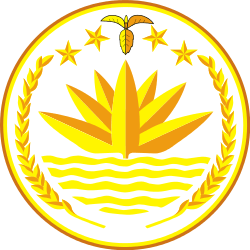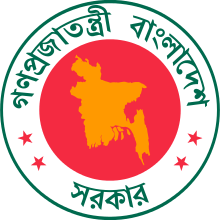Cabinet of Bangladesh
 |
| This article is part of a series on the politics and government of Bangladesh |
|
Constitution |
|
Executive |
|
|
Political parties |
|
Foreign policy |
The Cabinet of Bangladesh (Bengali: বাংলাদেশের মন্ত্রিসভা — Bānglādēśēr Mantri´sabhā) or Council of Ministers (Bengali: বাংলাদেশের মন্ত্রিপরিষদ — Bānglādēśēr Mantri´pariṣad) is the chief executive body of the People's Republic of Bangladesh. The Cabinet is the collective decision-making body of the entire government under the Office of the Prime Minister, composed of the Prime Minister and some 31 Cabinet Ministers, 17 State Ministers and 2 Deputy Ministers.
Responsibility
Ministers of the government, according to the Constitution of Bangladesh, are selected primarily from the elected members of House of Nation, also known as Jatiya Sangsad. Cabinet Ministers are heads of government departments, mostly with the office of the "Minister of [department, e.g. Defence]". The collective co-ordinating function of the Cabinet is reinforced by the statutory position that all the Ministers jointly hold the same office, and can exercise the same powers.
The Cabinet is the ultimate decision-making body of the executive within the parliamentary system of government in traditional constitutional theory of Bangladesh. This interpretation was originally put across in the work of the Bangladesh constitution in 1972. The political and decision-making authority of the cabinet has been gradually increased over the last few decades, with some claiming its role has been usurped by a "Prime Ministerial" (i.e. more "presidential") government.
The Cabinet is the executive committee of The Prime Minister's Office, a historic body which has legislative, judicial and executive functions, and whose large membership does include member(s) of the Opposition or Coalition. Its decisions are generally implemented either under the existing powers of individual government departments, or by the Cabinet Secretary.
Council of Ministers
The most influential part of the executive of the Bangladesh government are the ministries.[1] A ministry headed by minister or State minister (Independent Charges) shall be responsible for conducting the business of his Ministry/Division in the Parliament unless otherwise directed by the Prime Minister. The Secretary is the administrative head of a ministry or division, assisted by Additional Secretary, Joint Secretary, Deputy Secretary, Senior Assistant Secretary and Assistant Secretary. Few ministries are consisted of more than one divisions.
There are four categories of ministers, in descending order of rank:
- Minister: member of cabinet; leads a ministry
- State Minister (Independent Charges): junior minister not reporting to a cabinet minister; leads a ministry
- State Minister: junior minister reporting to a cabinet minister, usually tasked with a specific responsibility in that ministry
- Deputy Minister: most junior minister reporting to a cabinet minister or Minister of State (Independent Charges).
Cabinet Ministers
References
- ↑ http://www.bangladesh.gov.bd/index.php?option=com_weblinks&task=ministry&Itemid=152
- ↑ "Hon'ble Ministers". Retrieved 27 April 2015.
- ↑ "Cabinet". Retrieved 27 April 2015.
- ↑ http://www.cabinet.gov.bd/site/page/b31ecc34-a004-4528-b787-5b8381741a8c/Hon'ble-Advisers-
